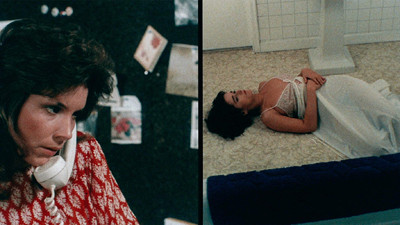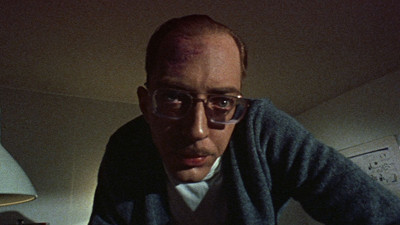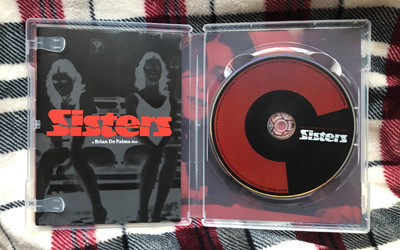| Reviews & Columns |
|
Reviews DVD TV on DVD Blu-ray 4K UHD International DVDs In Theaters Reviews by Studio Video Games Features Collector Series DVDs Easter Egg Database Interviews DVD Talk Radio Feature Articles Columns Anime Talk DVD Savant Horror DVDs The M.O.D. Squad Art House HD Talk Silent DVD
|
DVD Talk Forum |
|
|
| Resources |
|
DVD Price Search Customer Service #'s RCE Info Links |
|
Columns
|
|
|
Sisters: The Criterion Collection
The Criterion Collection // R // October 23, 2018
List Price: $27.96 [Buy now and save at Amazon]
The Film:
 While Brian De Palma directed several features before Sisters, it's the earliest of his works where the brazen, darkly comedic tension he's become known for took shape, which also announced his arrival in the suspense-horror genre. Afterwards, his viewpoint has come back numerous times to bleak, fanatical psychosis and physical abnormalities, as well as playful experimentation with the visual language of suspense through perspective and deception, little of which could've been as effective without figuring out what works and what doesn't. Sisters remains enough of an effective, unnerving thriller after nearly a half-decade of superior films cutting into the genre, yet its strength lies in how it embodies the tricks that De Palma would utilize in his later works. That's because the scatterbrained pastiche of emotions and homages that makes up its substance struggles to keep up with the momentum of the suspense throughout, resulting in a vivid, expressive, but clumsy early work from a master of his trade.
While Brian De Palma directed several features before Sisters, it's the earliest of his works where the brazen, darkly comedic tension he's become known for took shape, which also announced his arrival in the suspense-horror genre. Afterwards, his viewpoint has come back numerous times to bleak, fanatical psychosis and physical abnormalities, as well as playful experimentation with the visual language of suspense through perspective and deception, little of which could've been as effective without figuring out what works and what doesn't. Sisters remains enough of an effective, unnerving thriller after nearly a half-decade of superior films cutting into the genre, yet its strength lies in how it embodies the tricks that De Palma would utilize in his later works. That's because the scatterbrained pastiche of emotions and homages that makes up its substance struggles to keep up with the momentum of the suspense throughout, resulting in a vivid, expressive, but clumsy early work from a master of his trade.
Co-written by De Palma and Louise Rose with the vague notion of real Siamese twins in Russia as its foundation, Sisters quickly introduces the audience to actress Danielle Breton (Margot Kidder), whose involvement with a TV based on pranking strangers brings her together with marketing executive Philip Woode (Lisle Wilson). From the angle of a neighboring apartment building, an investigative newspaper journalist, Grace Collier (Jennifer Salt), believes she witnesses a murder transpire in Danielle's place, leading her to call the cops and pursue details involving what she believes that she saw. Encountering obstacles with both the actress and the police officers, Grace is forced to dig deeper into the history of Danielle Breton, which reveals some of the details about her hidden secret: that she once had a sister. From there, De Palma explores imperfect, strategically-concealed knowledge and a network of conspiracy as Grace sets off on a wild search for the truth about the murder she believes she witnessed … but can't prove actually happened.
Sisters begins on the stage of a game show, where contestants choose how an unaware individual will react to a scenario involving voyeurism, a physical handicap, and public nudity. De Palma sets the offbeat tone early on through this thought exercise, leaving the audience in a state of questioning his underlying motivations as the characters hole up in the nooks-‘n-crannies of Staten Island. While the introduction to Danielle's lifestyle and emotional baggage result in a quirky and unstable buildup of mood, the murder itself triggers a nightmarish dive into psychological terror that owes a lot to the works of Hitchcock and Polanski, both for the mental instability of the characters and the abrasive design of the plotting itself. Eventually, a split-screen perspective takes over to parallel what happens in Danielle's apartment with a journalist's imperfect witnessing of a bloody and violent act happening there, and De Palma's sharp orchestration of that effect and the consequences behind what he permits characters to learn -- and not -- transforms into the film's signature manifestation of intentions and curiosities.
unstable buildup of mood, the murder itself triggers a nightmarish dive into psychological terror that owes a lot to the works of Hitchcock and Polanski, both for the mental instability of the characters and the abrasive design of the plotting itself. Eventually, a split-screen perspective takes over to parallel what happens in Danielle's apartment with a journalist's imperfect witnessing of a bloody and violent act happening there, and De Palma's sharp orchestration of that effect and the consequences behind what he permits characters to learn -- and not -- transforms into the film's signature manifestation of intentions and curiosities.
The moving parts of that scene aren't all that's necessary for Sisters to succeed in what it sets out to do, though, and the performances pulled from De Palma's actresses revolve around an engaging, yet pulpy and exaggerated demeanor that distracts from the plot's trustworthiness. Jennifer Salt enlivens her character's spry gumshoe pursuits with probing glances and austere, strong-minded body language, fueled by Grace's professional obstacles in gaining trust as a recognizable yet still second-guessed and underestimated journalist. Kidder, on the other hand, exemplifies the traits of a suspicious and mentally wishy-washy actress, someone removed from the steadfast, plucky horror roles she handles well in Black Christmas and Amityville Horror. De Palma makes it pleasurable to watch the duo navigate the layers of intrigue and info made available to the audience, but their overstated and somewhat singularly-focused projections aren't as convincing as they should be on a pragmatic level, especially once Danielle gets in the same room with law enforcement. Something's off, we know it's off, and she doesn't hide it well.
It's easy to get wrapped up in the mysteries surrounding the murder and the lurking sibling duality of Sisters, but De Palma becomes so focused upon the twistiness of his devices that he neglects certain sensibilities that would've elevated his thriller by being more conscientious. The shiftiness deliberately baked into Kidder's performance carries over into lingering uncertainty about how the authorities handle Grace's concerns, while De Palma's playfulness involving pullout couches, the slickness of a floor, and the planned-out avoidance and destruction of evidence bump the film's tempo into the cusp of absurdity, relying on chronological flukes and accidents to make the premise work. Taken during the split-screen sequence and whenever De Palma taps into pitch-black humor, these can be shrugged off for the uniqueness of observing how the two sides interact with one another's timelines; however, the plotting doesn't stand on firm enough ground beyond the deliberate novelty, unraveling once the film rushes beyond the focal apartments and along Grace's connection of dots.
pullout couches, the slickness of a floor, and the planned-out avoidance and destruction of evidence bump the film's tempo into the cusp of absurdity, relying on chronological flukes and accidents to make the premise work. Taken during the split-screen sequence and whenever De Palma taps into pitch-black humor, these can be shrugged off for the uniqueness of observing how the two sides interact with one another's timelines; however, the plotting doesn't stand on firm enough ground beyond the deliberate novelty, unraveling once the film rushes beyond the focal apartments and along Grace's connection of dots.
Early on, De Palma offers glimpses at and partly prepares his audience for how dark and bizarre Sisters could possibly get, but there's enough restraint and clutching onto reality involved that dismissing the film's idiosyncrasies in preparation for an extravagant finish isn't so easy to do upon an initial viewing. Knowing what comes in the final act of this thriller -- and knowing how outlandish the tone eventually turns -- partly excuses those increasingly trivial issues, as they're conjoined with what leads into a grandiose nightmare of a conclusion that grows more fantastical as it progresses. Macabre symbolism involving female identity and a separation from constraints, both from male presences and from individual/personal issues, manifests in surreal fashion through unsubtle and, at times, perplexing revelations about Danielle's sister, her past, and the witnessed murder. While hard to believe, De Palma has a blast with psychological manipulation and misdirection in Sisters, and his commitment to the warped ideas coursing through his first horror film are deserving of the cult status it has developed.
The Blu-ray:
Fond memories of the earlier days of collecting Criterion Collection DVDs came rushing back upon opening the Blu-ray edition of Sisters. Released in 2000 as Spine #89, the original presentation functioned -- as least for myself -- as one of those gateway films for regular folks first getting into the collection, as it was a genuine horror movie that belonged with the other "important classic and contemporary films" also included in the collection (alongside the likes of Silence of the Lambs, Dead Ringers, Carnival of Souls, and Peeping Tom). But yeah, that was nearly two decades ago now, and the DVD could certainly use a little updating. With a familiar split-face aesthetic spun in a different direction, the front artwork echoes the old artwork without being very similar, while the inner Booklet contains information about the transfer, production credits, and several text items both old and new: "Psycho-Thriller, Qu'est-ce Que C'est?", by Carrie Rickey; an Interview with Brian De Palma, by Richard Rubenstein; and "Murder By Moog: Scoring the Chill", by Brian De Palma.
Video and Audio:
As I mentioned earlier, it's been almost twenty years since The Criterion Collection have brought Sisters onto the home video format, and since then it has undergone a new 16-bit 4K digital transfer from the original 35mm negative, supervised by director Brian De Palma. That last part about supervision always makes it difficult to critique a new presentation, leading some to take an objective, observational approach in respect to the filmmaker's wishes. Framed at 1.85:1 for its 1080p AVC transfer, Sisters looks noticeably darker and warmer than previous iterations. Skin tones lean into a richer, reddish-orange hue and cooler shades -- against brushed metal, white surfaces, blue clothing -- exhibit tan and/or teal casts that disrupt the anticipated colors from the previous presentation.
Black levels are, by and large, lower as well: there are instances where shadows are too oppressive and move in on details, while certain scenes are simply a shade or two dimmer and flatten out depth. With that in mind, this transfer also possesses an immense amount of satisfying detail, noteworthy in Grace's leather jacket, Danielle's lace garments, the weathering of wooden/metal walls, and the sharpness and translucence of cake icing. Film grain looks great for the most part -- digital compression seemed a little heavy at points -- and the adjusted color palette yields some exceptionally satisfying skin tones. Criterion's new treatment of Sisters ended up being a mixed bag for me, switching between impressive upticks in vividness and clarity to puzzling color choices and elevated darkness levels.
Bernard Hermann's eerie soundtrack compliments the stillness and expectation in the air of Sisters, often elevating small yet consequential sound effects. The monaural LPCM track handles its age with care, allowing the subtleties and sharpness of the music to hang in the quieter aspects of the track. Light sounds like the rattle of a pill bottle in a plastic bag, the unlocking of a bolt door and the click of a briefcase, and the rushing of faucet water telegraph sharp, natural sound effects with little, if any, sign of their 45+ year vintage on ‘em. Verbal delivery comes across on about the same level of impeccable and clean quality, though a few scenes struggle with mild muffling that doesn't in any way obscure the words being spoken. Slightly louder and more abrasive effects -- screeches and bodily stumbles -- offer adaptive, if at times unremarkable high-end responsiveness and low-end heft, while only mild fuzziness can be heard during the quietest of sequences. Sisters sounds pretty great.
Special Features:
 The only newly-created special feature crafted for Sisters can be found in the Interview with Jennifer Salt (24:07, 16x9 HD), in which the actress who plays grace offers some insights into the lifestyle that brought her together with Margot Kidder and Brian De Palma. She discusses the climate in which many of the filmmakers of the period had cultivated, her kinship with Kidder, and how she was essentially given the gift of the Sisters script (which reveals something kind of interesting about De Palma's personality). She also discusses the film's reception and how it's taken shape over the years, amounting to a fine, somewhat light but enjoyable interview stretch.
The only newly-created special feature crafted for Sisters can be found in the Interview with Jennifer Salt (24:07, 16x9 HD), in which the actress who plays grace offers some insights into the lifestyle that brought her together with Margot Kidder and Brian De Palma. She discusses the climate in which many of the filmmakers of the period had cultivated, her kinship with Kidder, and how she was essentially given the gift of the Sisters script (which reveals something kind of interesting about De Palma's personality). She also discusses the film's reception and how it's taken shape over the years, amounting to a fine, somewhat light but enjoyable interview stretch.
Effortlessly trumping their original, almost-bare DVD release, The Criterion Collection have also included a nearly thirty-minute discussion about Sisters, entitled The Autopsy (26:32, 16x9 HD) from 2004, which features interviews with De Palma and producers discussing the process of creating the film, emphasizing the visual language, the complex experience in working with Bernard Hermann, and the ties/odes to Hitchcock's Psycho. There's also an audio-only interview session entitled Brian De Palma at the AFI, 1973 that actually plays alongside the film, serving almost as a quasi-commentary that occasionally repeats stories told in the 2004 making-of piece, as well as Margot Kidder on The Dick Cavett Show, 1970 (8:56, 16x9 HD), in which they're sandwiched between Janis Jopin and Gloria Swanson. There's also a Photo Gallery and Radio Spots (3:31).
Final Thoughts:
Brian De Palma's Sisters remains an exhilarating, provocative psychological horror/thriller with enough things going for it to appreciate it without quite loving it. As an early example of the director's mounting Hitchcockian tension, visual expressiveness and macabre bravado, it's worthwhile; as a chaotic dose of horror with symbolism that's both bold and opaque at the same time, it's entrancing. Yet, there are enough head-scratching moments and rushed sensations in the finale to keep it pinned down from greatness, with bold, yet blunt performances from Jennifer Salt and Margot Kidder both spicing up the film and complicating its perceived practicality. De Palma clearly took the lessons learned here into his other, superior films that employ mental turmoil and identity issues, and as an early artifact of those successes, Sisters can be a lot of fun to revisit. The Criterion Collection's Blu-ray exhibits a director-approved transfer that's proficient enough while also having a few issues, but the audio and special features are indisputably worth taking a stab at this new disc. Strongly Recommended.
Thomas Spurlin, Staff Reviewer -- DVDTalk Reviews | Personal Blog/Site
 While Brian De Palma directed several features before Sisters, it's the earliest of his works where the brazen, darkly comedic tension he's become known for took shape, which also announced his arrival in the suspense-horror genre. Afterwards, his viewpoint has come back numerous times to bleak, fanatical psychosis and physical abnormalities, as well as playful experimentation with the visual language of suspense through perspective and deception, little of which could've been as effective without figuring out what works and what doesn't. Sisters remains enough of an effective, unnerving thriller after nearly a half-decade of superior films cutting into the genre, yet its strength lies in how it embodies the tricks that De Palma would utilize in his later works. That's because the scatterbrained pastiche of emotions and homages that makes up its substance struggles to keep up with the momentum of the suspense throughout, resulting in a vivid, expressive, but clumsy early work from a master of his trade.
While Brian De Palma directed several features before Sisters, it's the earliest of his works where the brazen, darkly comedic tension he's become known for took shape, which also announced his arrival in the suspense-horror genre. Afterwards, his viewpoint has come back numerous times to bleak, fanatical psychosis and physical abnormalities, as well as playful experimentation with the visual language of suspense through perspective and deception, little of which could've been as effective without figuring out what works and what doesn't. Sisters remains enough of an effective, unnerving thriller after nearly a half-decade of superior films cutting into the genre, yet its strength lies in how it embodies the tricks that De Palma would utilize in his later works. That's because the scatterbrained pastiche of emotions and homages that makes up its substance struggles to keep up with the momentum of the suspense throughout, resulting in a vivid, expressive, but clumsy early work from a master of his trade. Co-written by De Palma and Louise Rose with the vague notion of real Siamese twins in Russia as its foundation, Sisters quickly introduces the audience to actress Danielle Breton (Margot Kidder), whose involvement with a TV based on pranking strangers brings her together with marketing executive Philip Woode (Lisle Wilson). From the angle of a neighboring apartment building, an investigative newspaper journalist, Grace Collier (Jennifer Salt), believes she witnesses a murder transpire in Danielle's place, leading her to call the cops and pursue details involving what she believes that she saw. Encountering obstacles with both the actress and the police officers, Grace is forced to dig deeper into the history of Danielle Breton, which reveals some of the details about her hidden secret: that she once had a sister. From there, De Palma explores imperfect, strategically-concealed knowledge and a network of conspiracy as Grace sets off on a wild search for the truth about the murder she believes she witnessed … but can't prove actually happened.
Sisters begins on the stage of a game show, where contestants choose how an unaware individual will react to a scenario involving voyeurism, a physical handicap, and public nudity. De Palma sets the offbeat tone early on through this thought exercise, leaving the audience in a state of questioning his underlying motivations as the characters hole up in the nooks-‘n-crannies of Staten Island. While the introduction to Danielle's lifestyle and emotional baggage result in a quirky and
 unstable buildup of mood, the murder itself triggers a nightmarish dive into psychological terror that owes a lot to the works of Hitchcock and Polanski, both for the mental instability of the characters and the abrasive design of the plotting itself. Eventually, a split-screen perspective takes over to parallel what happens in Danielle's apartment with a journalist's imperfect witnessing of a bloody and violent act happening there, and De Palma's sharp orchestration of that effect and the consequences behind what he permits characters to learn -- and not -- transforms into the film's signature manifestation of intentions and curiosities.
unstable buildup of mood, the murder itself triggers a nightmarish dive into psychological terror that owes a lot to the works of Hitchcock and Polanski, both for the mental instability of the characters and the abrasive design of the plotting itself. Eventually, a split-screen perspective takes over to parallel what happens in Danielle's apartment with a journalist's imperfect witnessing of a bloody and violent act happening there, and De Palma's sharp orchestration of that effect and the consequences behind what he permits characters to learn -- and not -- transforms into the film's signature manifestation of intentions and curiosities. The moving parts of that scene aren't all that's necessary for Sisters to succeed in what it sets out to do, though, and the performances pulled from De Palma's actresses revolve around an engaging, yet pulpy and exaggerated demeanor that distracts from the plot's trustworthiness. Jennifer Salt enlivens her character's spry gumshoe pursuits with probing glances and austere, strong-minded body language, fueled by Grace's professional obstacles in gaining trust as a recognizable yet still second-guessed and underestimated journalist. Kidder, on the other hand, exemplifies the traits of a suspicious and mentally wishy-washy actress, someone removed from the steadfast, plucky horror roles she handles well in Black Christmas and Amityville Horror. De Palma makes it pleasurable to watch the duo navigate the layers of intrigue and info made available to the audience, but their overstated and somewhat singularly-focused projections aren't as convincing as they should be on a pragmatic level, especially once Danielle gets in the same room with law enforcement. Something's off, we know it's off, and she doesn't hide it well.
It's easy to get wrapped up in the mysteries surrounding the murder and the lurking sibling duality of Sisters, but De Palma becomes so focused upon the twistiness of his devices that he neglects certain sensibilities that would've elevated his thriller by being more conscientious. The shiftiness deliberately baked into Kidder's performance carries over into lingering uncertainty about how the authorities handle Grace's concerns, while De Palma's playfulness involving
 pullout couches, the slickness of a floor, and the planned-out avoidance and destruction of evidence bump the film's tempo into the cusp of absurdity, relying on chronological flukes and accidents to make the premise work. Taken during the split-screen sequence and whenever De Palma taps into pitch-black humor, these can be shrugged off for the uniqueness of observing how the two sides interact with one another's timelines; however, the plotting doesn't stand on firm enough ground beyond the deliberate novelty, unraveling once the film rushes beyond the focal apartments and along Grace's connection of dots.
pullout couches, the slickness of a floor, and the planned-out avoidance and destruction of evidence bump the film's tempo into the cusp of absurdity, relying on chronological flukes and accidents to make the premise work. Taken during the split-screen sequence and whenever De Palma taps into pitch-black humor, these can be shrugged off for the uniqueness of observing how the two sides interact with one another's timelines; however, the plotting doesn't stand on firm enough ground beyond the deliberate novelty, unraveling once the film rushes beyond the focal apartments and along Grace's connection of dots. Early on, De Palma offers glimpses at and partly prepares his audience for how dark and bizarre Sisters could possibly get, but there's enough restraint and clutching onto reality involved that dismissing the film's idiosyncrasies in preparation for an extravagant finish isn't so easy to do upon an initial viewing. Knowing what comes in the final act of this thriller -- and knowing how outlandish the tone eventually turns -- partly excuses those increasingly trivial issues, as they're conjoined with what leads into a grandiose nightmare of a conclusion that grows more fantastical as it progresses. Macabre symbolism involving female identity and a separation from constraints, both from male presences and from individual/personal issues, manifests in surreal fashion through unsubtle and, at times, perplexing revelations about Danielle's sister, her past, and the witnessed murder. While hard to believe, De Palma has a blast with psychological manipulation and misdirection in Sisters, and his commitment to the warped ideas coursing through his first horror film are deserving of the cult status it has developed.
The Blu-ray:
 |  |
Fond memories of the earlier days of collecting Criterion Collection DVDs came rushing back upon opening the Blu-ray edition of Sisters. Released in 2000 as Spine #89, the original presentation functioned -- as least for myself -- as one of those gateway films for regular folks first getting into the collection, as it was a genuine horror movie that belonged with the other "important classic and contemporary films" also included in the collection (alongside the likes of Silence of the Lambs, Dead Ringers, Carnival of Souls, and Peeping Tom). But yeah, that was nearly two decades ago now, and the DVD could certainly use a little updating. With a familiar split-face aesthetic spun in a different direction, the front artwork echoes the old artwork without being very similar, while the inner Booklet contains information about the transfer, production credits, and several text items both old and new: "Psycho-Thriller, Qu'est-ce Que C'est?", by Carrie Rickey; an Interview with Brian De Palma, by Richard Rubenstein; and "Murder By Moog: Scoring the Chill", by Brian De Palma.
Video and Audio:
As I mentioned earlier, it's been almost twenty years since The Criterion Collection have brought Sisters onto the home video format, and since then it has undergone a new 16-bit 4K digital transfer from the original 35mm negative, supervised by director Brian De Palma. That last part about supervision always makes it difficult to critique a new presentation, leading some to take an objective, observational approach in respect to the filmmaker's wishes. Framed at 1.85:1 for its 1080p AVC transfer, Sisters looks noticeably darker and warmer than previous iterations. Skin tones lean into a richer, reddish-orange hue and cooler shades -- against brushed metal, white surfaces, blue clothing -- exhibit tan and/or teal casts that disrupt the anticipated colors from the previous presentation.
Black levels are, by and large, lower as well: there are instances where shadows are too oppressive and move in on details, while certain scenes are simply a shade or two dimmer and flatten out depth. With that in mind, this transfer also possesses an immense amount of satisfying detail, noteworthy in Grace's leather jacket, Danielle's lace garments, the weathering of wooden/metal walls, and the sharpness and translucence of cake icing. Film grain looks great for the most part -- digital compression seemed a little heavy at points -- and the adjusted color palette yields some exceptionally satisfying skin tones. Criterion's new treatment of Sisters ended up being a mixed bag for me, switching between impressive upticks in vividness and clarity to puzzling color choices and elevated darkness levels.
Bernard Hermann's eerie soundtrack compliments the stillness and expectation in the air of Sisters, often elevating small yet consequential sound effects. The monaural LPCM track handles its age with care, allowing the subtleties and sharpness of the music to hang in the quieter aspects of the track. Light sounds like the rattle of a pill bottle in a plastic bag, the unlocking of a bolt door and the click of a briefcase, and the rushing of faucet water telegraph sharp, natural sound effects with little, if any, sign of their 45+ year vintage on ‘em. Verbal delivery comes across on about the same level of impeccable and clean quality, though a few scenes struggle with mild muffling that doesn't in any way obscure the words being spoken. Slightly louder and more abrasive effects -- screeches and bodily stumbles -- offer adaptive, if at times unremarkable high-end responsiveness and low-end heft, while only mild fuzziness can be heard during the quietest of sequences. Sisters sounds pretty great.
Special Features:
 The only newly-created special feature crafted for Sisters can be found in the Interview with Jennifer Salt (24:07, 16x9 HD), in which the actress who plays grace offers some insights into the lifestyle that brought her together with Margot Kidder and Brian De Palma. She discusses the climate in which many of the filmmakers of the period had cultivated, her kinship with Kidder, and how she was essentially given the gift of the Sisters script (which reveals something kind of interesting about De Palma's personality). She also discusses the film's reception and how it's taken shape over the years, amounting to a fine, somewhat light but enjoyable interview stretch.
The only newly-created special feature crafted for Sisters can be found in the Interview with Jennifer Salt (24:07, 16x9 HD), in which the actress who plays grace offers some insights into the lifestyle that brought her together with Margot Kidder and Brian De Palma. She discusses the climate in which many of the filmmakers of the period had cultivated, her kinship with Kidder, and how she was essentially given the gift of the Sisters script (which reveals something kind of interesting about De Palma's personality). She also discusses the film's reception and how it's taken shape over the years, amounting to a fine, somewhat light but enjoyable interview stretch. Effortlessly trumping their original, almost-bare DVD release, The Criterion Collection have also included a nearly thirty-minute discussion about Sisters, entitled The Autopsy (26:32, 16x9 HD) from 2004, which features interviews with De Palma and producers discussing the process of creating the film, emphasizing the visual language, the complex experience in working with Bernard Hermann, and the ties/odes to Hitchcock's Psycho. There's also an audio-only interview session entitled Brian De Palma at the AFI, 1973 that actually plays alongside the film, serving almost as a quasi-commentary that occasionally repeats stories told in the 2004 making-of piece, as well as Margot Kidder on The Dick Cavett Show, 1970 (8:56, 16x9 HD), in which they're sandwiched between Janis Jopin and Gloria Swanson. There's also a Photo Gallery and Radio Spots (3:31).
Final Thoughts:
Brian De Palma's Sisters remains an exhilarating, provocative psychological horror/thriller with enough things going for it to appreciate it without quite loving it. As an early example of the director's mounting Hitchcockian tension, visual expressiveness and macabre bravado, it's worthwhile; as a chaotic dose of horror with symbolism that's both bold and opaque at the same time, it's entrancing. Yet, there are enough head-scratching moments and rushed sensations in the finale to keep it pinned down from greatness, with bold, yet blunt performances from Jennifer Salt and Margot Kidder both spicing up the film and complicating its perceived practicality. De Palma clearly took the lessons learned here into his other, superior films that employ mental turmoil and identity issues, and as an early artifact of those successes, Sisters can be a lot of fun to revisit. The Criterion Collection's Blu-ray exhibits a director-approved transfer that's proficient enough while also having a few issues, but the audio and special features are indisputably worth taking a stab at this new disc. Strongly Recommended.
|
| Popular Reviews |
| Sponsored Links |
|
|
| Sponsored Links |
|
|
| Release List | Reviews | Shop | Newsletter | Forum | DVD Giveaways | Blu-Ray | Advertise |
|
Copyright 2024 DVDTalk.com All Rights Reserved. Legal Info, Privacy Policy, Terms of Use,
Manage Preferences,
Your Privacy Choices | |||||||












